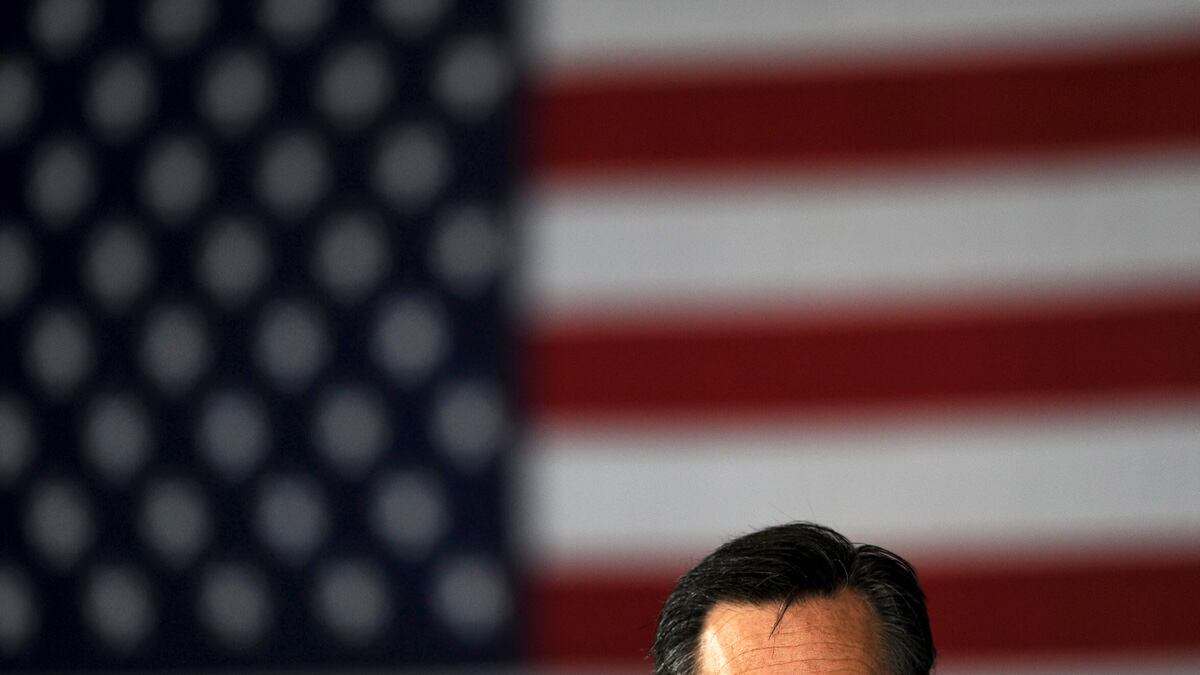Maybe it’s time, at long last, to give Mitt Romney a break—Romney and every other politician who sheds the armor of his or her poll-tested message to expose the soft underbelly of genuine humanity.

It has been a very long time since a presidential candidate has been permitted to act like a normal human. You probably have to go all the way back to Harry Truman, who during his 1948 “give ’em hell” campaign once appeared at a late-night rally wearing his pajamas.
“I’m sorry, I’ve gone to bed,” Truman apologized to the crowd who had gathered in Missoula, Mont., during his famous whistle-stop tour. “But I thought you would like to see what I looked like even if I didn’t have any clothes on.”
Romney, by contrast, is always fastidiously coiffed and scripted, so it’s potentially refreshing whenever he departs from his talking points. But when the former Massachusetts governor and leveraged buyout mogul told a mildly amusing story the other day, an anecdote about his father’s first gubernatorial campaign in Michigan, he was hammered by the media-political complex.
And that’s a shame—yet another inducement, if any more were needed, for elected officials to retreat into a fortress of slick television commercials, focus-grouped rhetoric, and outright prevarications in order to conceal their real selves in the service of winning.
The Republican presidential frontrunner’s story, which he related during a telephone town hall with Wisconsin voters in advance of Tuesday’s primary, concerned George Romney’s decision, as president of American Motors in 1954, to shut down a factory in Michigan and move operations to Wisconsin.
“Now, later he decided to run for governor of Michigan,” Mitt recounted, “and so you can imagine that having closed the factory and moved all the production to Wisconsin was a very sensitive issue to him, for his campaign, and I recall at one parade where he was going down the streets, he was led by a band, and they had a high-school band that was leading each of the candidates, and his band did not know how to play the Michigan fight song. They only knew how to play the Wisconsin fight song, so every time they would start playing ‘On, Wisconsin,’ ‘On, Wisconsin,’ my dad’s political people would jump up and down and try to get them to stop because they didn’t want people in Michigan to be reminded that my dad had moved production to Wisconsin.”
Romney’s story, on its face, is a parable of the frequent absurdity of politics and campaigning, which often present reality as viewed through a funhouse mirror; by telling it, Romney not only revealed his little-known sardonic side (and an appreciation of the bizarre nature of the democratic process that speaks well of his sense of perspective), but he also treated Wisconsin voters like grownups who are themselves sophisticated about that process.
Predictably, the Democratic Party and the Obama campaign’s media machine pounced on the anecdote as further evidence that Romney is an out-of-touch plutocrat with zero capacity to feel the pain of laid-off autoworkers, never mind that the great majority of these particular workers, who lost their jobs in Michigan 58 years ago, are feeling no pain themselves.
Disappointingly, the journalism establishment followed suit, reflexively portraying Romney’s stab at “humorous” storytelling as yet another instance of political malpractice, on a par with his blurting out that he likes to fire people, that he is “not concerned about the very poor,” two recent gaffes that fit perfectly into the "Romney as Richie Rich" caricature. On Thursday’s installment of Now, MSNBC’s lively panel show hosted by Alex Wagner, not a single participant, not even conservative columnist S.E. Cupp, was willing to defend Romney’s remarks. In other words, if Mitt were minimally competent at the tradecraft of politics, he would avoid revealing his true self to voters and risking the possibility that they wouldn’t accept him on his own terms.
Better he should hide behind his highly paid consultants—a lesson that, no doubt, Romney will take to heart. And if the ruse is deemed successful (and so far the jury is very much out on his efforts to remake himself from a Massachusetts moderate into a “severe” conservative), the media will applaud and heap praise on his savvy communications team. One would think that political journalists would try to encourage a little honesty, even the occasional display of a foible or two, in their presidential candidates. But all too often, the price exacted for behaving like a human being is far too dear.
The losers, of course, are the voters, who, by Election Day, won’t have encountered the real man, merely the carefully calibrated package.






